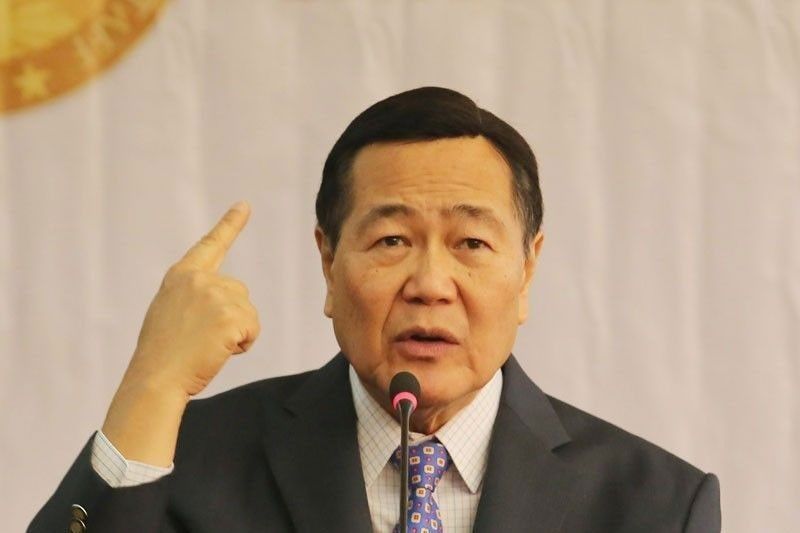Duterte query answered: UN could pressure China on West Philippine Sea

MANILA, Philippines — An order from the United Nations could pressure China to respect Philippine sovereignty in the West Philippine Sea, a retired Supreme Court justice told President Rodrigo Duterte after he claimed otherwise.
Duterte, during a pre-recorded meeting with Cabinet members that was aired Monday night, called out retired SC justice Antonio Carpio directly, asking him partially in Filipino: "If the United Nations will ask China to surrender because of that award given to us, will China give in to that?"
The chief executive also verbally attacked Caprio, calling him a "dreamer" who runs his mouth. The former justice played a key role in the Philippines’ historic victory against China before the Permanent Court of Arbitration.
"Getting a UN resolution in your country's favor is already a huge victory because that means the world community is behind your country," Caprio replied on Tuesday. "That strengthens enormously your country's position and weakens greatly your adversary's position."
"This is how a country defends its national interest. A country cannot just fold up and give up just because the other side is stubborn. That is a childish mentality."
How effective are UN resolutions?
Presidential spokesman Harry Roque during a virtual briefing later Tuesday said that all this was Caprio's "erroneous" personal opinion.
"[O]nly [UN] Security Council resolutions are binding on all member states and, of course, general assembly resolutions are non-binding," he said.
Caprio in his statement did not claim that UN General Assembly resolutions were binding.
What he did say was that when such resolutions are coupled with consensus in the international community, they may incentivize even superpowers such as the US to comply.
The former justice cited a resolution approved by the UN General Assembly in 1987 that called on the US to comply with an International Court of Justice ruling that favored Nicaragua.
The ICJ ruling stated that Washington, in violation of international law, used force against another state and intervened in its affairs by supporting the Contras, a right-wing rebel group, and by mining Nicaraguan harbors.
"After several years the US eventually complied to the satisfaction of Nicaragua," Caprio said while adding that the superpower "suffered a huge reputational cost and decided to cut a deal."
He also cited a UNGA resolution passed with overwhelming approval in 2019, ordering the United Kingdom "to return the Chagos Archipelago to Mauritius pursuant to an opinion of the International Court of Justice."
The islands, which the UK retained even after Mauritius gained independence in 1968, are a main strategic asset for Britain in the Indian Ocean. It paid Mauritius around 4 million euros or P23,298,138 for the islands and in the 1970s forcibly removed between 1,500 to 2,000 people from Diego Garcia, the largest island in the archipelago, which it then leased to the US as an airbase.
"So far the UK has not complied," Carpio said. "However, its reputation as a law-abiding country is taking a beating."
Senators: All options available except surrender
Duterte on Monday night also repeated his claim that the Philippines cannot assert its sovereignty in its own waters because that would result in war with China, alarming senators who urged against surrendering on the issue.
READ: Duterte: This is not the time to send 'gray ships' to West Philippine Sea
"He’s the leader of our country and he’s the commander-in-chief of our armed forces. He can think of anything and speak about anything except surrender," Sen. Panfilo Lacson said in an interview with CNN Philippines' "The Source."
Lacson is a Philippine Military Academy graduate and former national police chief. He chairs the Senate committee on national defense.
He added that if members of the military interpret Duterte's comments as surrendering to China, "it could be disastrous to Philippine sovereignty."
Meanwhile, Sen. Risa Hontiveros said it was embarrassing that the Philippines' own commander-in-chief would talk about ceding territory to China.
"This president swore an oath to defend the constitution and the Philippine nation. A constitution that renounces war as an instrument of national policy," Hontiveros said.
"So if a 'war' he cannot wage is the only way he can think of to confront China, then that betrays the moral and intellectual bankruptcy of the highest office of the land."
Both senators also reiterated calls on the government to work with the international community to effectively counteract Beijing's aggression in contested waters, noting that this strategy has been emphasized by the departments of foreign affairs and national defense.
- Latest
- Trending






























